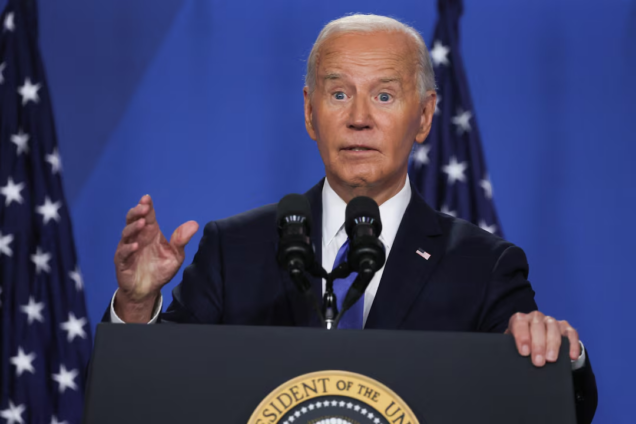President Joe Biden is to remove the US designation of Cuba as a state sponsor of terrorism as part of a prisoner release deal, the White House said on Tuesday.
Shortly afterwards, Cuba announced it would release 553 prisoners detained for "diverse crimes". It is hoped these will include participants in anti-government protests four years ago.
President-elect Donald Trump reinstated the country's terror designation in the final days of his first presidency in 2021, banning US economic aid and arms exports to the country.
But on Tuesday, a Biden administration official said an assessment of the situation had presented "no information" that supported the designation.
Cuba said Biden's move was a step "in the right direction" despite its "limited nature".
"This decision puts an end to specific coercive measures that, along with many others, cause serious damage to the Cuban economy, with a severe effect on the population," the country's Ministry of Foreign affairs said in a statement.
Hundreds of prisoners will "gradually" be freed following talks brokered by the Catholic Church, a separate statement read a few hours later.
Details about the prisoners have not been announced - it was hoped the deal would prompt the release of some protesters imprisoned after large anti-government protests in Cuba over the nation's economic decline in 2021.
Cuba currently sits alongside North Korea, Syria and Iran on the US State Sponsors of Terrorism list.
This means they are deemed by the US to have "repeatedly provided support for acts of international terrorism".
Adding Cuba back to the list after its removal in 2015 by President Barack Obama, Trump citied the communist country's backing of Venezuelan leader Nicolas Maduro.
At the time Cuba called the move "cynical," "hypocritical" and an act of "political opportunism".
Alongside prompting the prisoner release, this decision is also significant because it can be seen as a step towards normalising relations between Cuba and the US.
This could pave the way for dialogue on other contentious issues.
It could also help Cuba's dire economic situation, as some major banks and foreign investors have struggled to operate there legally.
Biden is to notify Congress of his plans, which also include reversing Trump-era financial restrictions on some Cubans, a White House statement said.
He will also suspend the ability of individuals to make claims to confiscated property in Cuba, the statement read.
It is unclear whether Trump will reverse this latest decision when he returns to office on 20 January.
The president-elect's nominee as the next US secretary of state, Marco Rubio, has long advocated for sanctions on Cuba.
His family left the country in the 1950s before the communist revolution that put Fidel Castro in power.
Latest Stories
-
Edudzi Tameklo welcomes suspended CJ’s application for injunction; says it’s refreshing
8 minutes -
Cedi stability partly due to NPP policies – Prof. Bokpin
12 minutes -
April Producer Price Inflation drops to 18.5%
13 minutes -
Reliable power crucial for 24-hour economy – Asantehene
22 minutes -
Meet the 37 members of the 8th NDPC
30 minutes -
Government receives $174m as part payment from sale of Newmont’s Akyem Mine
32 minutes -
Climate expert cautions public against use of tainted glasses in residential buildings
40 minutes -
Cedi appreciation driven by mixed domestic and global factors – Prof. Quartey
43 minutes -
Uphold human rights in migrant removals – CHRAJ urges authorities
44 minutes -
EU experts praise Ghana’s 2024 elections
45 minutes -
Ato Forson achieved in 4 months what Bawumia failed to do in 8 years – Osman Ayariga
46 minutes -
Famous Apple designer Sir Jony Ive joins OpenAI
59 minutes -
Target sales hit as Trump tariffs take effect
1 hour -
Nike to hike prices as it faces tariffs uncertainty
1 hour -
UK sea temperatures soar after exceptionally warm Spring
2 hours

